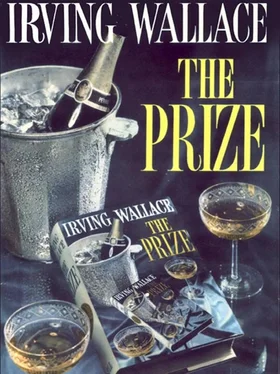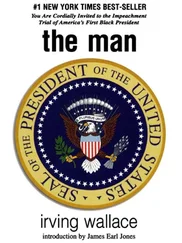They all went inside. Mr. Manker and Jacobsson led them through a gloomy hall, up wide stone steps to the first floor above the one at ground level, and then through a beige door into a long corridor, which was cheerfully lighted and awesomely scholastic. To their immediate right was a librarian’s desk, now unattended, and next to it the portal to the Nobel Library, whose stacks bulged with the literary produce, in almost every language, of the Nobel winners, contenders, as well as associated material.
With a possessiveness that came from familiarity, Jacobsson took them along the corridor, lined with shelves of books on either side, to another door that opened into a colossal auditorium. As they passed through the auditorium, Jacobsson said, ‘We are approaching our Kaaba, the holy place where the Academy members convene annually to elect a Nobel winner. The secret chamber is called the sessions room. And here we are.’
They entered one more door and found themselves in a bright, broad room, high-ceilinged, with tall windows looking down on the historic square below. Beneath a sparkling crystal chandelier rested a rectangular table, which seemed to fill the room, and drawn up neatly around the table were twelve ornate chairs, their seats, backs, and armrests covered with blue plush. The glossy table was bare, except for a wooden tray holding a pen set that had belonged to King Gustavus III almost two centuries before, and a pewter pitcher and a glass vase. Against the walls were a blue-covered sofa and additional easy chairs, and on one wall hung a gleaming gold medallion engraved with Gustavus III’s royal symbol, bound wheat stalks. At the head of the table, behind the Permanent Secretary’s chair, stood the Academy’s ever-present conscience-a marble bust of the founder, Gustavus III, perched on a circular stone pedestal.
‘Yes,’ Jacobsson was saying, as he patted the marble bust, ‘ever since 1914, when the Academy took over this room, His Majesty has sat here listening to secrets the entire world would like to know. Before that, the voting was held in the Permanent Secretary’s home on Skeppsbron, then in a rented apartment at Engelbrektsgatan, and then in the old Nobel Library at Norra Bantorget. But since Romain Rolland was selected in 1915, every literary laureate has been voted the prize right here.’
‘How often do the Academy members meet in this room?’ Emily inquired.
‘I will explain the modus operandi ,’ said Jacobsson. ‘Let us take the case of our current winner-Mr. Andrew Craig. Nominations for the Nobel Prize in literature this year, as always, were closed this last February first. Nominations, usually in writing, were submitted to the Swedish Academy. There were forty-nine this year. Thirty came from properly accredited sources-previous winners in any category or recognized academies throughout the world-and nineteen came from unaccredited sources, such as authors’ publishers or wives or the authors themselves, and were thrown out. Mr. Craig’s name was formally submitted, not from a foreign source, but by eligible admirers in our own Swedish Academy, led by Miss Ingrid Påhl, a voting member. I think Mr. Flink can better tell you how that came about.’
Indent Flink addressed himself to Craig and Leah. ‘I claim no credit,’ he insisted with false modesty. ‘I am in the business of publishing, and I have a part-time book scout in New York, just as I have scouts in Paris and London. Mr. Craig’s last novel, which had been overlooked in Scandinavia, was sent to me with a bushel of other books. I was impressed-it’s a rattling good story-and I bought the Swedish rights on Armageddon for five hundred dollars. I believe that was the price?’
‘That was the price,’ said Leah.
‘I had the translation made, and brought the novel out in September of-let me see-four years ago. The reviews were so overwhelming that, I believe, many of the eighteen members of the Academy read it and became acquainted with Mr. Craig.’
‘Quite so,’ said Jacobsson.
‘Well, to make a long story short,’ Flink continued, ‘I bought up two more of Mr. Craig’s novels, the sales were gratifying, but the enthusiasm in literary circles was even greater. Then I acquired a copy of The Perfect State , and it was the best of the lot. I translated it myself, and published it early last year. This time, I had my cake and ate it, too. It was a runaway best seller, and it was a critical rave. Well, I think that did it. An Andrew Craig cult had sprung up in the Academy-not only Miss Påhl, but others-and he was nominated for the prize in February.’
Craig had listened attentively, detached, as if hearing another author being discussed. Then he realized that the others in the room were looking at him, and among them Emily, and almost for the first time he became aware that it was he himself who was the subject of Flink’s little reminiscence. He knew that something was expected of him. ‘My American publisher thanks you, my agent thanks you, the Miller’s Dam Security Bank thanks you, and I thank you, Mr. Flink.’
‘In turn, the world thanks you,’ Flink said grandly.
Embarrassed, Craig sought to change the subject. ‘Count Jacobsson, exactly what happened after the nominations last February-or is that secret?’
‘Not at all,’ said Jacobsson. ‘Four members of the Academy’s eighteen serve as a weeding-out board. The leading books, by the thirty official nominees, were turned over to them. Many of the works, like your own, were already in Swedish and easy to read. Others had never been translated, and so the four board members had to read them in their original languages. Besides Swedish, the board members read well in English, French, German and Spanish. Where a nominated work might be in an exotic language like Chinese or Hindu, it would be turned over to special consultants who are linguists. Language is a barrier, but I doubt if it has ever barred consideration of a work of real merit. I am thinking, at the moment, of 1913, when Rabindranath Tagore, of India, was nominated for his poetry. He had only one volume in English, when he was nominated. There were none in Swedish. The cream of his creativity was in his native Bengali. The four-man sifting board located a Swedish professor, an avid Orientalist, who could read Bengali. So charmed was he by Tagore that he tried to teach our Academy members Bengali that they might appreciate the poet in his own tongue. But the Academy members found Bengali too formidable, and awaited the professor’s translation. It was accurate enough, and beautiful enough, to convince all that Tagore must have the prize.’
‘Then the literary award is actually in the hands of four men,’ said Stratman.
‘By no means,’ replied Jacobsson. ‘The four-man board merely does the preliminary job. This year, they read the primary works of the thirty nominees, and eliminated twenty-four, and settled on six names as the final contenders. The best books of these six-Mr. Craig, another American author, two Germans, one English-man, and a Japanese-were sent to all the other Academy members, along with excerpts, translated into Swedish, of other writings of the nominees. All through this past summer, the eighteen members of the Academy read and read.
‘And now to reply to your earlier question, Miss Stratman-in the middle of September they all met formally, for the first time, in this room, to discuss what they had read, to sound out one another, to speak for their favourite works. One morning last month, in November, they met in this room a second time-gathered about the table here, the door locked, visitors not admitted-and they prepared to select the year’s winner. The chairman of the four-person sifting board rose to his feet, right over there, and he said, “We have reduced the thirty nominations to six, and of these six, we wish to recommend two names in particular.” He then offered Mr. Craig’s name as a first choice, and an English author’s name-I am not at liberty to identify him-as a second choice. He then read biographies of Mr. Craig and the five other nominees. After that, he read both favourable and unfavourable critiques of each man’s literary work. Then the debate began. It lasted six hours. If you think Swedes are calm and pacific, I wish that you could attend one such wrangle. There was much passion, for and against-not only you, Mr. Craig, but every nominee. At last, ballots were passed down the table. Sixteen voted and two abstained. I am happy to say, Mr. Craig, you won by a creditable majority. Immediately, I was informed. I prepared the notification cable that same evening, and it went out to you directly. Shortly after that, the press was given the news by the Foreign Ministry.’
Читать дальше












